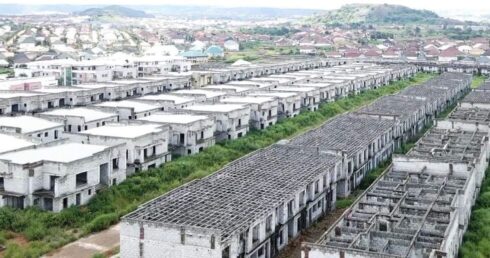The Economic and Financial Crimes Commission (EFCC) has secured a landmark ruling leading to the forfeiture of a massive property comprising 753 duplexes and other apartments in the Cadastral Zone, Abuja. The Federal Capital Territory High Court in Apo, presided over by Justice Jude Onwuegbuzie, ordered the permanent forfeiture of the property on December 2, 2024.
According to court documents, the estate, spanning 150,500 square meters and valued at billions of naira, was allegedly acquired through kickbacks linked to forex allocations by Godwin Emefiele, the immediate-past Governor of the Central Bank of Nigeria (CBN). The EFCC has described the property as its single largest recovery since its establishment in 2003, emphasizing the scale of corruption involved in its acquisition.
Allegations of Monumental Fraud
The EFCC’s investigation uncovered that Emefiele and his associates orchestrated “monumental fraud” during his tenure as CBN Governor. According to an affidavit filed in court, the EFCC alleged that Emefiele negotiated kickbacks in exchange for granting foreign exchange to companies and received bribes from contractors handling projects for the apex bank.
The proceeds from these unlawful activities were allegedly funneled into real estate investments, including the massive Abuja estate. Documents linked to the property were discovered during a search of the office of Ifeanyi Omeke, an alleged crony of Emefiele. The EFCC reported that the property, identified as Plot 109, Cadastral Zone C09, Lokogoma District, had been abandoned since June 2023, following Emefiele’s arrest.
Financial Trail and Criminal Cases
The EFCC revealed that the property was acquired through three companies, which paid a total of ₦2.2 billion. Investigators determined that the payments were made using funds obtained from illegal activities. The directors of these companies have been arrested, with their statements corroborating the allegations.
Emefiele is currently facing multiple charges across three courts. He is being prosecuted for procurement fraud, forgery, and fraudulent financial dealings involving $4.5 billion and ₦2.8 billion. In a separate case, he is accused of approving the printing of ₦684.5 million banknotes at an inflated cost of ₦18.96 billion. These cases highlight a pattern of corruption that allegedly facilitated the acquisition of numerous properties.
EFCC Defends Concealment of Owner’s Identity
Responding to public criticism over the initial concealment of the property owner’s identity, EFCC spokesman Dele Oyewale clarified that the agency acted within the framework of the law. He stated that the forfeiture proceedings were conducted under Section 17 of the Advance Fee Fraud Act, which allows for action against property rather than individuals in cases of unclaimed assets.
Oyewale explained that revealing suspects’ identities prematurely would be unprofessional, especially since the criminal investigations are ongoing. He assured the public that the EFCC remains committed to unearthing the full extent of the fraud and holding those responsible accountable.
Efforts to reach Emefiele’s legal team for comments were unsuccessful, as his lead counsel, Matthew Burkaa (SAN), did not respond to inquiries at the time of this report.
Social Media Reactions and Public Outcry
The revelation has sparked heated debates on social media platforms, with many criticizing the EFCC for perceived opacity. Some users accused the agency of shielding high-profile individuals while parading smaller fraudsters. One user questioned, “What does it take to be transparent? After all, they reveal smaller fraudsters and make them carry cards for mugshots.”
Others highlighted the moral lessons in the scandal. A commenter remarked, “In any position we are given, let us serve and not forget that we will give account.” However, some expressed skepticism over the EFCC’s ability to secure a conviction, pointing out that the alleged fraud involves layers of corporate maneuvering that may complicate direct links to Emefiele.
Next Steps in the Anti-Corruption Battle
The EFCC stated that the court had ordered the interim forfeiture of the property on November 1, 2024, with no opposition to its permanent forfeiture request as of December 2. The agency remains committed to continuing its criminal investigation and pursuing legal action to ensure accountability.
While efforts to obtain comments from Emefiele’s legal team were unsuccessful, the case has reignited discussions about the role of accountability and transparency in public office. As the investigation unfolds, many Nigerians await the outcome, which could set a precedent in the fight against corruption.
Table of Contents
Discover more from OGM News NG
Subscribe to get the latest posts sent to your email.














